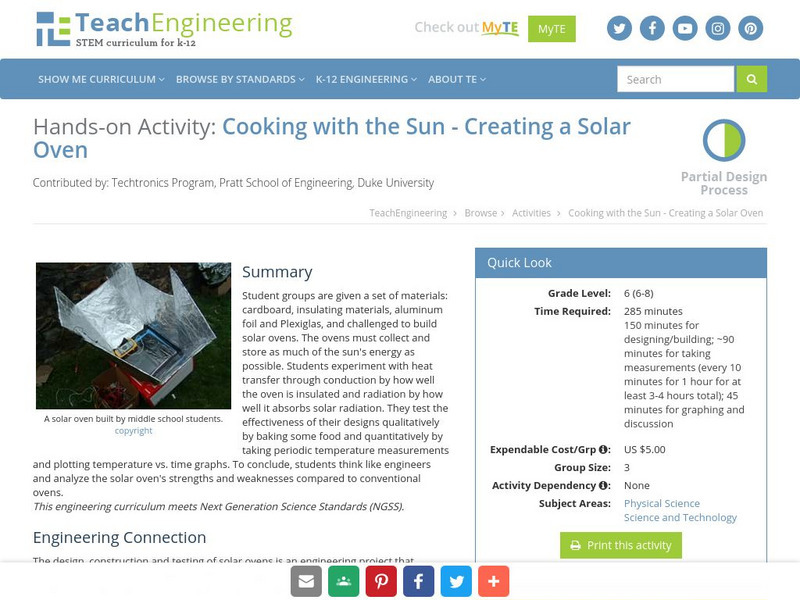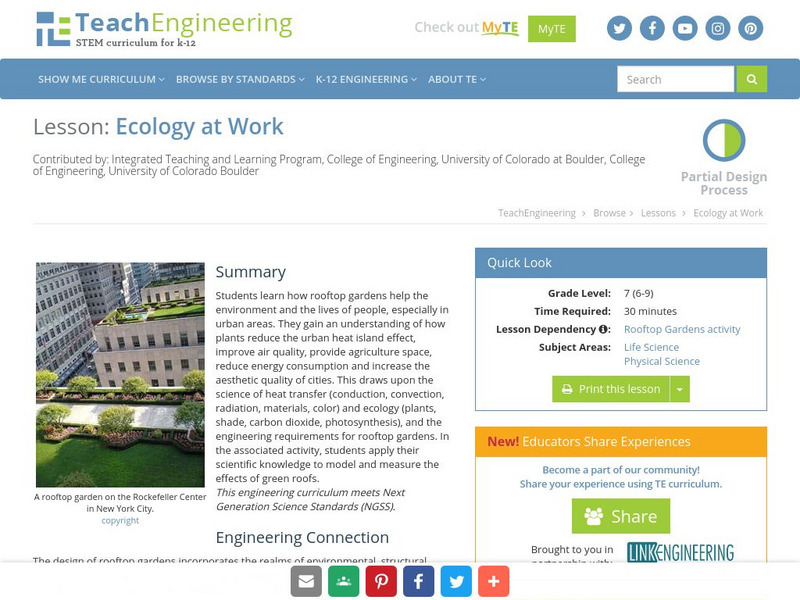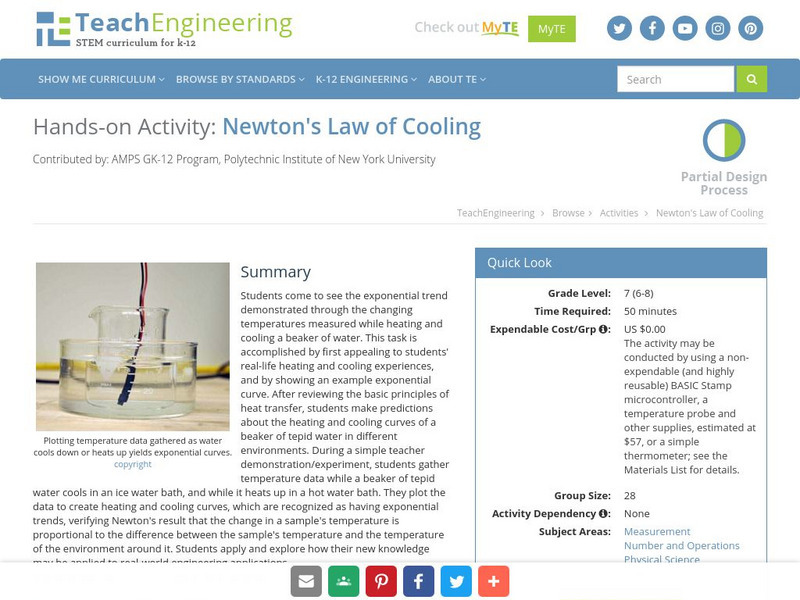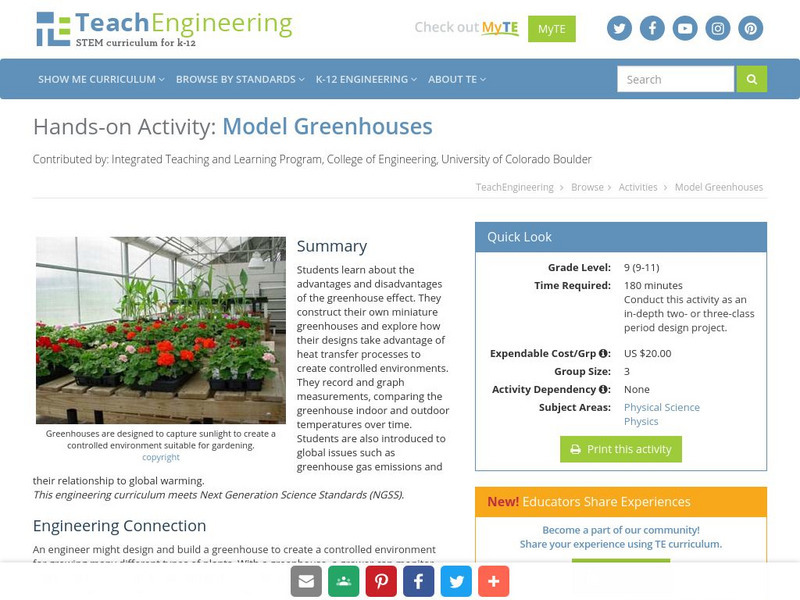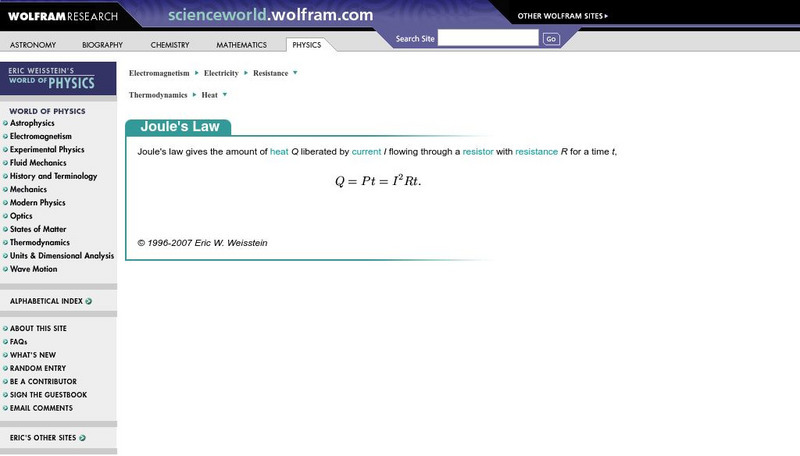Hi, what do you want to do?
CK-12 Foundation
Ck 12: Calorimetry
[Free Registration/Login may be required to access all resource tools.] Using diagrams and practice problems, students learn how the units of calories are used to measure the energy of the heat transfer. They also discover how...
Concord Consortium
Concord Consortium: Heat and Temperature
Learn that temperature measures average kinetic energy, and heat is the transfer of energy from hot systems to cold systems. Consider what makes a good conductor. (Requires Java)
Physics4kids
Physics4 kids.com: Thermodynamics & Heat: Enthalpy
Concise information about enthalpy, the measure of the total energy of a thermodynamic system.
Other
Ask Numbers: Measurement Conversion Calculators and Charts
What kind of unit conversion would you like to do? This site will allow you to do a multitude of conversions. Just click on the specific measurement you are needing to convert. It also provides a history of measurements and a chart of...
TeachEngineering
Teach Engineering: Let's Get Breezy!
Students apply an understanding of the concept of heat transfer through convection, conduction, and radiation as they use wireless temperature probes to investigate the heating capacity of different materials under heat lamps.
Concord Consortium
Concord Consortium: Stem Resources: Greenhouse Light and Temperature
An interactive tool where students can create a model of a greenhouse and use a light sensor to measure the amount of light it receives from a lamp at various times of the day. Temperature is also measured. Data is plotted on graphs,...
TeachEngineering
Teach Engineering: Cooking With the Sun Creating a Solar Oven
For this activity, students will be given a set of materials: cardboard, a set of insulating materials (i.e. foam, newspaper, etc.), aluminum foil, and Plexiglas. Students will then become engineers in building a solar oven from the...
CK-12 Foundation
Ck 12: Kinetic Theory of Temperature
[Free Registration/Login may be required to access all resource tools.] In this online lesson students will be introduced to conditions required for an ideal gas. They will also learn about the similarities and differences between...
US Energy Information Administration
U.s. Eia Energy Kids: Energy Units Basics
Instructions for converting the physical measurements of different types of fuels, such as gallons or barrels, to British thermal units (Btu), allowing for cross-comparison.
Physics Classroom
The Physics Classroom: Thermal Physics: Thermometers as Speedometers
Through interactive exercises and illustrated tutorials, students answer the fundamental questions: What is the reading on a thermometer the reflection of? What does temperature measure?
ClassFlow
Class Flow: Temperature Heat and the Sun
[Free Registration/Login Required] In this lesson students are introduced to temperature, heat and solar radiation. Students learn the methods of measuring and converting temperature between different units and identifying factors which...
TeachEngineering
Teach Engineering: Ecology at Work
Students learn how rooftop gardens help the environment and the lives of people, especially in urban areas. They gain an understanding of how plants reduce the urban heat island effect, improve air quality, provide agriculture space,...
TeachEngineering
Teach Engineering: Newton's Law of Cooling
Middle schoolers come to see the exponential trend demonstrated through the changing temperatures measured while heating and cooling a beaker of water. This task is accomplished by first appealing to students' real-life heating and...
TeachEngineering
Teach Engineering: Model Greenhouses
Students learn about the advantages and disadvantages of the greenhouse effect. They construct their own miniature greenhouses and explore how their designs take advantage of heat transfer processes to create controlled environments....
American Chemical Society
Middle School Chemistry: The Ups and Downs of Thermometers
Based on experimental observations, students describe, on the molecular level, why the liquid in a thermometer goes up when it is heated and down when it is cooled.
Chemistry Collective
Chem Collective: Camping Problem
Measure the enthalpy of a reaction and then create a solution warm enough to cook food.
Cuemath
Cuemath: Temperature
The article explains temperature. Specifically, you will learn about the temperature scale, temperature scale conversions, and the types of instruments used to measure temperature. Included are solved examples and interactive problems...
Other
Unit conversion.org: Online Unit Converter
Need a unit converter? Links to the most common converters provide access to the answers you need quickly.
TeachEngineering
Teach Engineering: What a Drag
Students learn about friction and drag - two different forces that convert energy of motion to heat. Both forces can act on a moving object and decrease its velocity. Students learn examples of friction and drag, and suggest ways to...
Mocomi & Anibrain Digital Technologies
Mocomi: Fun Facts About Temperature
Learn about units of temperature and other interesting facts.
PBS
Pbs Teachers: About All You Can Eat: Truth or Consequences
Demonstrate how calories are measured by building a calorimeter to measure the transfer of heat energy during a chemical or physical change. Test and record data on the calories in a peanut.
Wolfram Research
Wolfram Science World: Joule's Law
This site briefly defines Joule's Law. A formula is provided and links to related terms.
Other
Digital Library for Earth System Education: Teaching Box: Essentials of Weather
A suite of lessons focusing on the basic elements of climate and weather. Inquiry-based exploration of extreme weather events and the factors of weather including clouds, wind, air pressure, temperature, and the water cycle.










